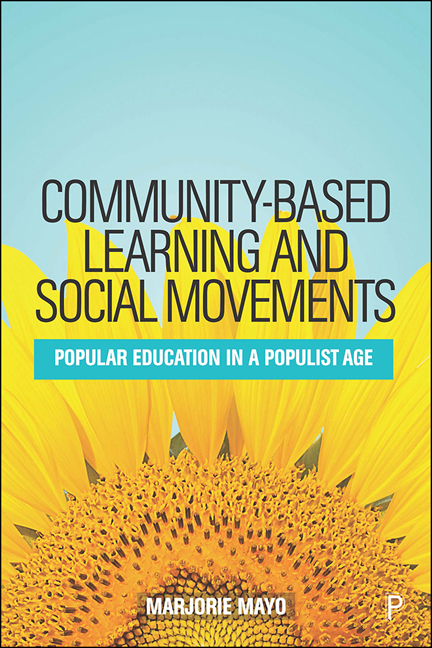Book contents
- Frontmatter
- Dedication
- Contents
- List of Figures
- Acknowledgements
- 1 Popular Education in a Populist Age
- 2 Popular Education and its Roots
- 3 Spaces and Places for Popular Education and Participatory Action Research
- 4 Principles and Practice
- 5 Sharing Understandings of Varying Histories and Cultures
- 6 Making Connections: Linking Issues and Struggles Across Space and Time
- 7 Power and Power Analysis
- 8 Community–University Partnerships
- 9 Taking Emotions into Account
- 10 Looking Backwards, looking Forwards
- References
- Index
3 - Spaces and Places for Popular Education and Participatory Action Research
Published online by Cambridge University Press: 10 March 2021
- Frontmatter
- Dedication
- Contents
- List of Figures
- Acknowledgements
- 1 Popular Education in a Populist Age
- 2 Popular Education and its Roots
- 3 Spaces and Places for Popular Education and Participatory Action Research
- 4 Principles and Practice
- 5 Sharing Understandings of Varying Histories and Cultures
- 6 Making Connections: Linking Issues and Struggles Across Space and Time
- 7 Power and Power Analysis
- 8 Community–University Partnerships
- 9 Taking Emotions into Account
- 10 Looking Backwards, looking Forwards
- References
- Index
Summary
This book started from increasing concerns about the growth of Far Right populism, racism and violence, along with rising disquiet about ‘fake news’ in various international contexts. How might popular education and participatory action research contribute to the development of alternative approaches in response to these contemporary challenges, building support for more constructive ways forward? Although these concerns have become increasingly evident over the past couple of years or so, they have roots that date further back in the history of adult education more generally. According to Brookfield and Holst (adult educators who were shocked by the invasion of Iraq in 2003), adult education seemed to have lost its moorings, becoming ‘uncoupled from its traditional, mainstream view of itself as a movement to create and build democracy’ (Brookfield and Holst, 2011: 1). Adult education had traditionally been concerned with developing critical thinking, ‘countering any process of brainwashing or ideological manipulation’ (Brookfield and Holst, 2011: 2), they argued, promoting ‘the health of participatory democracy’. How could such approaches to learning enable people to organise more effective resistance to contemporary challenges? Reflecting back on these developments in 2011, in the US context, this might seem hopelessly out of date, they acknowledged, given the policy emphasis on adult learning for ‘skilling’ or ‘retooling’ America's workforce to compete in the global economy. Were there still spaces and places for alternative approaches? Still, they argued, there were lessons to be drawn from earlier approaches, with relevance for those, like themselves, who were concerned ‘with organizing education for and encouraging learning about the creation of democracy in political, cultural, and economic spheres’ (Brookfield and Holst, 2011: 4). At the time of writing, a decade and a half on from the invasion of Iraq, these lessons would seem more relevant than ever.
Although Brookfield and Holst focused on adult education in general, their questions have particular relevance for popular education more specifically. First, Brookfield and Holst emphasised the importance of connecting adult learning with participatory democracy, raising questions about the political, cultural and economic spaces with which to engage.
- Type
- Chapter
- Information
- Community-based Learning and Social MovementsPopular Education in a Populist Age, pp. 41 - 56Publisher: Bristol University PressPrint publication year: 2020



